
The Royal Horticultural Society (RHS), founded in 1804 as the Horticultural Society of London, is the UK's leading gardening charity.

The poinsettia is a commercially important flowering plant species of the diverse spurge family Euphorbiaceae. Indigenous to Mexico and Central America, the poinsettia was first described by Europeans in 1834. It is particularly well known for its red and green foliage and is widely used in Christmas floral displays. It derives its common English name from Joel Roberts Poinsett, the first United States minister to Mexico, who is credited with introducing the plant to the US in the 1820s. Poinsettias are shrubs or small trees, with heights of 0.6 to 4 m. Though often stated to be highly toxic, the poinsettia is not dangerous to pets or children. Exposure to the plant, even consumption, most often results in no effect, though it can cause nausea, vomiting, or diarrhea.

Horticulture is the cultivation of plants in gardens or greenhouses, as opposed to the field-scale production of crops characteristic of agriculture. It includes the cultivation of fruits, vegetables, nuts, seeds, herbs, sprouts, mushrooms, algae, flowers, seaweeds and non-food crops such as grass and ornamental trees and plants. It also includes plant conservation, landscape restoration, landscape and garden design, construction, and maintenance, and arboriculture, ornamental trees and lawns.

The RHS Chelsea Flower Show, formally known as the Great Spring Show, is a garden show held for five days in May by the Royal Horticultural Society (RHS) in the grounds of the Royal Hospital Chelsea in Chelsea, London. Held at Chelsea since 1912, the show is attended by members of the British royal family.
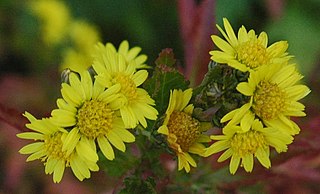
Chrysanthemums, sometimes called mums or chrysanths, are flowering plants of the genus Chrysanthemum in the family Asteraceae. They are native to East Asia and northeastern Europe. Most species originate from East Asia and the center of diversity is in China. Countless horticultural varieties and cultivars exist.
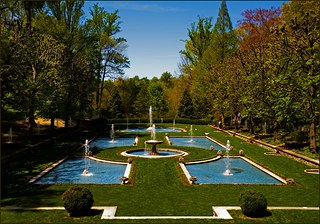
Longwood Gardens is a botanical garden that consists of over 1,077 acres of gardens, woodlands, and meadows in Kennett Square, Pennsylvania, United States in the Brandywine Creek Valley. It is one of the premier horticultural display gardens in the United States and is open to visitors year-round to enjoy native and exotic plants and horticulture, events and performances, seasonal and themed attractions, as well as educational lectures, courses, and workshops.
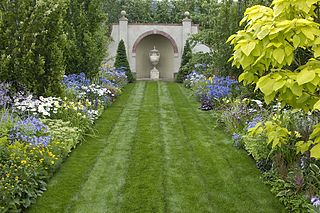
RHS Flower Show Tatton Park held at Tatton Park, near Knutsford, Cheshire, first began in 1999 by the Royal Horticultural Society. The show houses the RHS National Flower Bed Competition, Young Designer of the Year Award and a wide range of inspirational show gardens, smaller 'Back to Back' gardens, visionary gardens and a number of marquees displaying prize plants and flora exhibits. Other key features of the show are the floral marquee and plant plaza, the arts and heritage pavilion, and the floral design studio.

Clivia miniata, the Natal lily or bush lily, is a species of flowering plant in the genus Clivia of the family Amaryllidaceae, native to woodland habitats in South Africa and Eswatini. It is also widely cultivated as an ornamental.

Misericordia University is a private Roman Catholic university in Dallas, Pennsylvania. It was founded by the Religious Sisters of Mercy in 1924 as College Misericordia; in 2007 it became a university and changed its name. The university offers bachelor's, master's and doctoral degrees as well as post-master's and post-bachelor's certificates. The university operates a campus in Pittsburgh, Pennsylvania where it offers an accelerated Bachelor of Science in Nursing program in partnership with Orbis Education.
Philadelphia Green, a program of the Pennsylvania Horticultural Society, is a large urban greening program that serves southeastern Pennsylvania. Since 1974, Philadelphia Green has supported the development and ongoing care of community gardens, neighborhood parks, and public green spaces in Philadelphia.
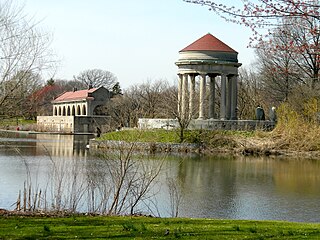
Franklin Delano Roosevelt (FDR) Park is a park located along the Delaware River in the southernmost point of South Philadelphia, Pennsylvania, comprising some 348 acres (1.41 km2) which includes a 146-acre (0.59 km2) golf course, about 125 acres (0.51 km2) of buildings, roadways, pathways for walking, landscaped architecture, and a variety of picnic and recreation areas placed within about 77 acres (310,000 m2) of natural lands including ponds and lagoons.
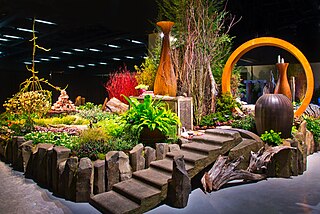
The Northwest Flower & Garden Show is an annual exhibition of horticulture and gardening held in Seattle, Washington, for five days each February. It is the largest garden show west of Philadelphia and is regarded as the second largest garden show in the country. It is held at the Washington State Convention Center, and has been since the first year. The show has lush, fully built display gardens, over 90 educational and entertaining seminars, and a garden marketplace exclusively for plants, gardening supplies, botanical art, – the largest Marketplace of any garden show in the U.S.
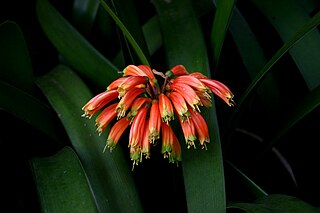
Clivia nobilis, the green-tip forest lily, is a species of flowering plant in the genus Clivia, of the family Amaryllidaceae, native to South Africa. It grows to about 38 cm (15 in). It has evergreen strap-shaped leaves, and bears pendent umbels of multiple narrow, trumpet-shaped, red and yellow flowers, tipped with green.
John Caspar Wister was one of the United States' most highly honored horticulturists.

The Pennsylvania Horticultural Society (PHS) is a nonprofit organization that promotes horticulture-related events and community activities. It is headquartered in Philadelphia, Pennsylvania. As of 2021, PHS has more than 13,000 members.
Ernesta Drinker Ballard was an American horticulturalist and feminist. Among the founders of the National Organization for Women, the National Abortion and Reproductive Rights Action League, and Women's Way, Ballard was the executive director of the Pennsylvania Horticultural Society from 1963 to 1981, credited by The New York Times with bringing its annual Philadelphia Flower Show to "international prominence."
Gary M. Radin is an American designer, philanthropist and author. Radin heads up the creative studio GMRdesign, is co-editor of the book "What If It's Not Alzheimer's? - A Caregiver's Guide to Dementia" and co-founder of a not-for-profit. He currently resides in the Philadelphia area and works nationally.

A rose show is a horticultural exhibition focusing exclusively on roses.
Mary Helen Wingate Lloyd (1868–1934) was an American horticulturist who was a founding member of the American Iris Society and creator of a celebrated "iris bowl" garden.
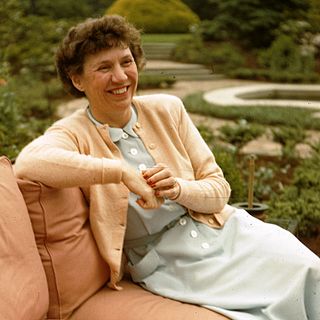
Pamela Cunningham Copeland was an American horticulturist and historic preservationist, known for her philanthropy. Her home and gardens became Mt. Cuba Center, a public garden and research center for Appalachian Piedmont flora that was added to the National Register of Historic Places in 2003.


























